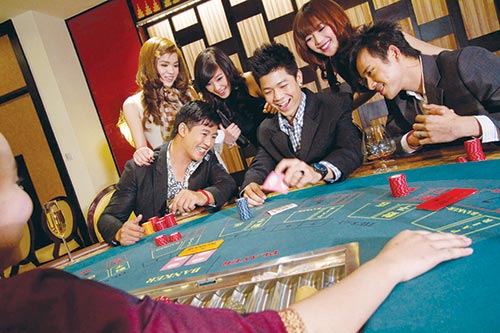Casino to spin the wheel on locals

Will allowing Vietnamese access to casinos spur investment in gaming emporiums? - Photo: Le Toan
Last week, the Ministry of Finance (MoF) revealed a draft of the Decree on Casino Businesses that included a proposal to allow Vietnamese over the age of 21 to enter casinos. The Vietnamese government is now canvassing public opinion on this new policy.
This is the first time the MoF has proposed that Vietnamese should be allowed to enter casinos in the draft decree. In the past the ministry has held firm on its position that only foreign passport holders are allowed to enter gaming facilities.
Whether this particular part of the decree will make its way into the final document is uncertain, as it still has to receive government approval, but the fact that it has been proposed reflects that there may be a shift in lawmakers’ thinking.
If the proposal is approved, Vietnam would undoubtedly be more attractive to foreign casino operators, who have been suggesting the government allow Vietnamese into casinos for years.
“Large integrated resorts require enough visitors on a regular basis to be truly successful,” said Colin Pine, general director of the Ho Tram Project Company – owner and operator of the nation’s current biggest casino the Grand Ho Tram in the southern province of Ba Ria-Vung Tau.
“While there is significant demand in greater Asia for casino gaming at integrated resorts, relying on inbound tourism is a major challenge,” he added.
Currently, Vietnam has seven casinos licensed nationwide, serving only foreigners, while Vietnamese are banned from entering. At least three casino projects are currently awaiting government approval.
Casino operators like Las Vegas Sands have proposed building integrated casino-resort complexes in Vietnam, but only on the condition that the ban on Vietnamese is lifted.
In 2012, Malaysian casino operator Genting withdrew from its partnership with VinaCapital to build a $4 billion casino and resort in the South Hoi An complex in the central province of Quang Nam because the government insisted on maintaining its ban on locals.
Pine said large integrated resorts needed critical mass, and this was evidenced by the success of other leading resort cities such as Las Vegas, Singapore, or Macau, and also Orlando Florida, with its concentration of amusement parks.
In fact, casinos in Vietnam are not viable businesses if they can only depend on foreign visitors.
For example, Haiphong Joint Venture International Tourism Corp, the owner of Do Son Resort & Casino, the first gaming facility built in the country, in May reported to local authorities that it had suffered huge losses because it was welcoming fewer Chinese visitors. Its accumulated loss through the end of 2012 was VND169.1 billion, or roughly $8.5 million.
Australia’s Donaco International, which in May inaugurated a five-star Aristo International Hotel and Casino in the northern province of Lao Cai, also cited the tensions between Vietnam and China as the reason for its lower Chinese tourist numbers.
“The more people that can participate in the full offering of entertainment facilities, the more entertainment facilities there can be and the more successful the tourism and entertainment sector will be,” Pine said.
The idea of allowing Vietnamese to participate in casino gaming has sparked a fierce debate in recent years. Many economists and lawmakers oppose it, saying it would lead to and promote social evils. But many others are in staunch support, citing that Vietnamese are currently travelling to Cambodia or other countries to gamble.
“The reality is that Vietnamese citizens are already gambling in casinos, it is just that those casinos are in other countries. When Vietnamese citizens gamble in casinos outside Vietnam, the government not only loses out on tax revenue and foreign currency, but there are also no guidelines or controls over them,” Pine noted.
Pine believed that allowing Vietnamese to enter casinos in Vietnam in a controlled and legal way would be a better solution to address the current demand for gaming, and it would also benefit the state by providing tax revenues that are currently going to other countries’ treasuries.
“Different countries that have casino gaming have taken different approaches to ensuring that it doesn’t create unmanageable social issues,” he explained, citing Singapore’s charging an entrance fee to get into casinos to ensure that low-income citizens would not spend too much time playing casino games.
What the stars mean:
★ Poor ★ ★ Promising ★★★ Good ★★★★ Very good ★★★★★ Exceptional
Latest News
More News
- US firms deepen energy engagement with Vietnam (February 05, 2026 | 17:23)
- Vietnam records solid FDI performance in January (February 05, 2026 | 17:11)
- Site clearance work launched for Dung Quat refinery upgrade (February 04, 2026 | 18:06)
- Masan High-Tech Materials reports profit: a view from Nui Phao mine (February 04, 2026 | 16:13)
- Hermes joins Long Thanh cargo terminal development (February 04, 2026 | 15:59)
- SCG enhances production and distribution in Vietnam (February 04, 2026 | 08:00)
- UNIVACCO strengthens Asia expansion with Vietnam facility (February 03, 2026 | 08:00)
- Cai Mep Ha Port project wins approval with $1.95bn investment (February 02, 2026 | 16:17)
- Repositioning Vietnam in Asia’s manufacturing race (February 02, 2026 | 16:00)
- Manufacturing growth remains solid in early 2026 (February 02, 2026 | 15:28)
















 Mobile Version
Mobile Version